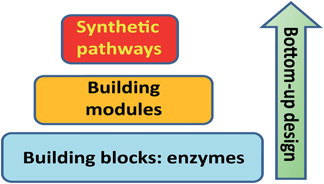While most in vitro synthetic biology projects are usually used for the purposes of basic science research or the formation of high-value products, cell-free synthetic pathway biotransformation (SyPaB), which can implement complicated biochemical reactions by the in vitro assembly of numerous enzymes and coenzymes, would be used for low-cost biomanufacturing. In this article, we present bottom-up design principles for SyPaB from basic building blocks (enzymes and/or immobilized enzymes) to basic modules, such as NAD(P)H regeneration, NAD(P)H consumption, ATP regeneration, and extra ATP removal. A combination of thermostable enzymes (called thermoenzymes) with immobilization on solid supports, especially nano-materials and/or electrodes, would greatly prolong enzyme lifetime, enhance mass transfer, and facilitate product/biocatalyst separation. With developments in stable building blocks and modules (called biocatalytic modules), SyPaB has the potential to become a low-cost biomanufacturing platform for biofuels production and even biological CO2 fixation.

You have access to this article
 Please wait while we load your content...
Something went wrong. Try again?
Please wait while we load your content...
Something went wrong. Try again?


 Please wait while we load your content...
Please wait while we load your content...